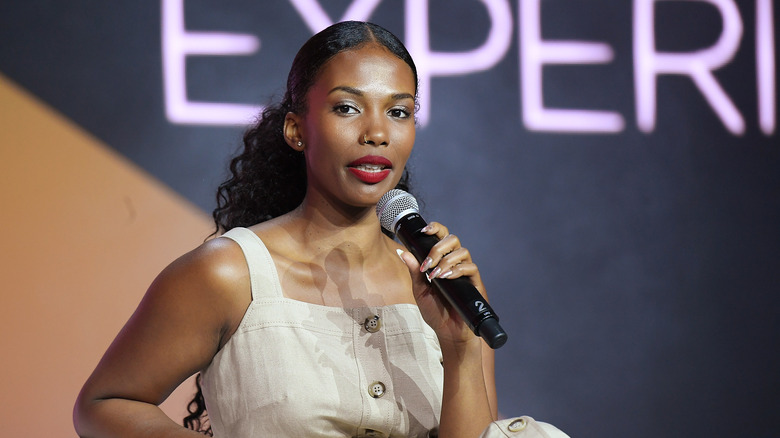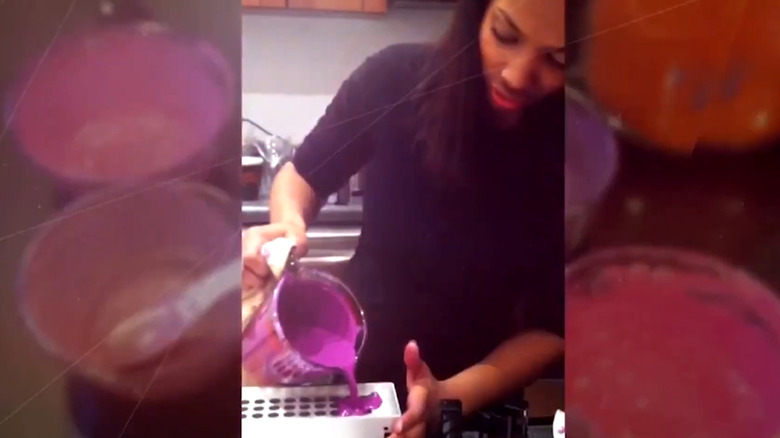Here's What Went Down With The Lip Bar After Shark Tank
The Lip Bar's CEO, Melissa Butler, appeared on "Shark Tank" in February 2015 with her partner Rosco Spears and asked the Sharks for $125,000 in exchange for a 20% equity stake in their burgeoning cosmetics company, which they'd started in 2012. The friends since high school knew they had a good product that filled a niche. "I was working on Wall Street and I was really frustrated with the beauty industry," Butler told CNBC. "I hated the excessive amounts of chemicals. I hated the lack of diversity."
Wanting to set the record straight and create clean beauty that challenged white, Euro-centric standards and its limited, one-shade-fits-all color options, Butler started making all-natural lipsticks in her kitchen in wild, unusual colors — like purple, yellow, bold blue, and green, because she was "trying to prove a point." She shared them with Spears, who immediately believed in Butler's product, and became TLB's creative director. "My girl was making something with her bare hands that we could actually put on and wear outside," Spears told Makeup.com. Though their product didn't impress the Sharks, their rejection on the show fueled Butler and Spears to keep swimming.
What happened to The Lip Bar on Shark Tank?
If you watch the Lip Bar segment from "Shark Tank," it's painfully clear from the start that Melissa Butler and Rosco Spears were not taken seriously. Perhaps it's unsurprising that a group of old, (mostly) white guys wouldn't understand or appreciate why two young Black women would want to challenge current beauty standards, never mind consider why it's so worthwhile.
"This is a new innovation, I can see a massive market share in the clown market," smirked Kevin O'Leary aka Mr. Wonderful, who was by far the most insulting Shark. Later he asked Spears, who was wearing sage lipstick, "Aren't you worried if you walked into a bar with that color lip, somebody would try to resuscitate you?" Despite Spears saying the color drives sales because people ask her about it, O'Leary said, "The chances that this is a business are practically zero, because you can't get share," noting that if another company thought these hues would sell, they'd make them themselves and "crush you like the colorful cockroaches you are."
The other Sharks weren't helpful either. Daymond John said, "It's lipstick. I'm out." Robert Herjavec and Mark Cuban had issues with the cocktail-themed concept and logo. While lone female Shark Lori Greiner was kind, she couldn't see beyond the then online-only business model.
The Lip Bar after Shark Tank
It was crystal clear that the Sharks lacked vision, couldn't think beyond basic, typical (white) lip shades, and clearly didn't appreciate that women of color might have different cosmetic needs — not to mention the appeal of vegan, cruelty-free cosmetics. But Melissa Butler and Rosco Spears were now more motivated than ever to expand their business.
"They were really cruel to us," Butler told CNBC. "I had to reposition my thoughts in that moment, I had to reposition that anger and really use it to drive this idea." She added, "I couldn't allow someone else to be the authority on my dream." Butler also mentioned that now big companies like Maybelline and MAC are following their lead with unusual lip shades. It's a reminder that, "when you're small, you really have to use that to your benefit and be nimble and do things that the larger companies can't do."
Since then, TLB has expanded, abandoning its cocktail theme and ditching the lip-stained martini glass logo Mark Cuban and Robert Herjavec found problematic. They've also expanded to other makeup products. "When The Lip Bar started, we had 12 SKUs, all of which were bullet lipsticks," Spears told Makeup.com. "Now, we've transitioned our brand and we have over 150 SKUs," she said, emphasizing their focus on "inclusion, women's empowerment, and knocking down the traditional standards of beauty," in a natural, sustainable, cost-effective way. And they're continuing to grow.
The Lip Bar is not only still in business, it's thriving
The Lip Bar has continued to expand on the products offered. Besides lipsticks, they now offer a multitude of products, including foundations in at least 26 shades — which is not something many companies offer. "If it doesn't look good on deeper skin tones, we won't launch it, and that's not a claim too many other brands can make," Butler told BeautyMatter.
Where they once couldn't get distribution, The Lip Bar is now available in big stores, including Walmart, Meijer, and Target. TLB products were available on Target's website in 2016, just a year after "Shark Tank," and are available in 750 Target stores across the country. Butler made the deal through cold emails and messaging contacts she found on LinkedIn. "I didn't know how to pitch to them, but I knew that my product would work there, and I knew that they needed my consumer," Butler told CNBC. "You always want to think about business from the perspective of, this needs to be a mutually beneficial relationship." With patience and persistence, Butler got the agreement. By February 2023, the company had six feet of wall space in Target stores. "We are the first [black-owned] makeup company to take up this much space," Butler wrote on Instagram. "I just love making Black History during Black History Month."
What's next for The Lip Bar?
Feeling the beauty industry's unmet need to cater to the Gen Z market, The Lip Bar launched a new brand called Thread Beauty in 2021. It provides the same types of high-quality products, sustainable cosmetics in varied shades for people of all skin colors, but focuses on Gen Z, particularly creators of color on TikTok and Instagram. "We found that this group of creatives aren't limited by what the package says a product is or can do," Melissa Butler told BeautyMatters. "In their world, lipstick is blush, a gloss is an eye topper, and foundation can really be anything." So Thread Beauty focuses on this adaptability of products while continuing their emphasis on inclusivity, diversity, and accessibility. Assuring their target audience can afford it, all Thread Beauty products are priced at $8 or less.
In 2019, TLB opened its flagship store in Detroit — Butler and Rosco Spears' hometown. They partnered with Michelle Obama before the 2020 election to increase voter participation, and celebrated their 10-year anniversary in 2022. They took out a billboard "thanking" Kevin O'Leary, writing on Instagram, "Here's to many more years of challenging beauty standards and ignoring the haters." The company is still doing well, gaining an additional $6.7 million in funding in 2022. It has grown faster than the industry average, with 25 employees, an annual revenue of $5.5 million, and as of 2023, a net worth of $15 million. Suck on that, Mr. Wonderful.

